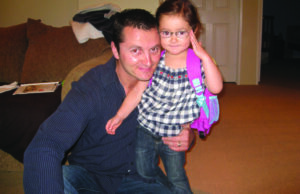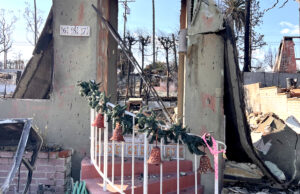America celebrates the 2024 total solar eclipse
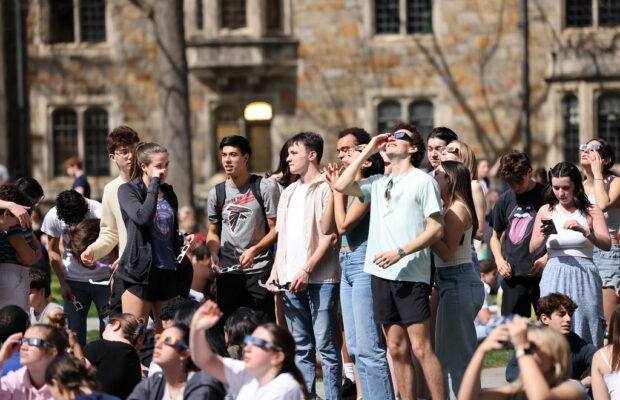
An out of world experience. That was what people around the world were looking for when they stood still peering up into the sky on April 8, 2024. The total eclipse, a phenomenon that lasts only four minutes and 30 seconds, was what drew people from across the globe to certain areas in America with the hopes of experiencing a total blackout.
The eclipse itself occurs when the moon passes between the earth and the sun, temporarily obscuring the sun from the earth. When the moon, earth and the sun are aligned, the moon casts a temporary shadow on earth. This event last took place in 2017, and is expected to pass over the U.S. again in 2044.
NPHS experienced a partial eclipse, but some areas in America experienced a total eclipse or “blackout”, which served as a five minute tourist attraction. Chasing the eclipse’s “path of totality”, Stephen Svoboda, earth and marine science teacher, traveled with his family to Fredericksburg, Texas.
Having traveled twice before, Svoboda is no stranger to the eclipse. “I went to China in 2009 and I went to Wyoming in 2017, so I’ve done this a few times,” Svoboda said. As an ardent eclipse chaser, Svoboda is able to describe in detail the experience that comes with being in the path of totality. “It’s dark and you feel the temperature go down; the birds all stopped chirping and there were birds in my area – that’s why we picked it because there were trees with birds and they stopped chirping when the totality hit,” Svoda said.
Lisa Adams, Algebra 2 and AP Pre-calc teacher, traveled with her husband to Austin, Texas to witness the eclipse. “I’ve seen partial eclipses many times but this was my first time seeing the total eclipse,” Adams said.
Witnessing this phenomenon for the first time, Adams noticed the astonishing effects it took on her surroundings. “It was cool to experience the temperature change and the animals kind of went nuts when all the solar lights went on because they thought it was night time,” Adams said.
Jill Barnes, a third grade teacher at Township Elementary in Simi Valley, experienced the strides her school took to keep the kids safe during school hours, since not all students had access to solar eclipse glasses.
To take precautions and prevent students looking up into the sky and harming their eyes, the school required students to be checked out by a parent or guardian if they wanted to see the eclipse. “It was kind of tough because I can see how the school district didn’t want to be liable for students looking up into the sun; but it was a special event, so maybe we should have done more to honor it,” Barnes said.
Barnes ensured that her students were able to safely celebrate the eclipse by watching live NASA footage, as well as facilitating an in-class discussion about the event. “We talked about the solar system a little, to try to just make it engaging and a little informative without putting anybody at harm,” Barnes said.
Deborah Dogancay, Chemistry and Theory of Knowledge teacher, discovered how universally recognized this phenomenon was while traveling to Dallas, Texas. “On the plane there were people in front of me that were also seeing the eclipse and they wore eclipse shirts, so it’s actually a big deal there in Texas…a lot of people went there specifically for that,” Dogancay said.
Despite how exciting this opportunity was, Dogancay had many worries that came along with traveling across the country. “There were moments where I was like ‘oh no we spent this money, we traveled, we’re missing a day of school and what if it’s cloudy and we can’t even see it’, so it was a big risk,” Dogancay said.
Overall, the community was well supported throughout the eclipse to ensure no one would miss out on the experience. “The public works department was driving around town and finding people walking and handing out free eclipse glasses for anyone that didn’t have them,” Dogancay said.
Svoboda believes the money spent, time consuming travel and risk of missing the eclipse was worth it in the end. “Until you get that 100 percent totality it’s not the [full] experience,” Svoboda said.
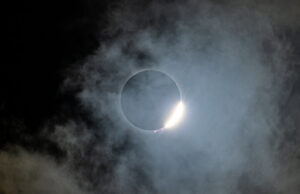
Gather! – The eclipse looked different across the country. Some traveled to its most extreme locations. Photo courtesy of Flickr.
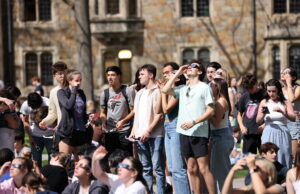
Experience! – Students at the University of Michigan gather in the Law Quad to cheer for the eclipse. Photo courtesy of Corey Seeman.

Let there be light! – The eclipse allows people to see the light of the solar corona. Photo courtesy of NASA.

